How 'Irreversible' Shames Hollywood
Irreversible remains potent and provocative 20 years later, backwards and and forward.
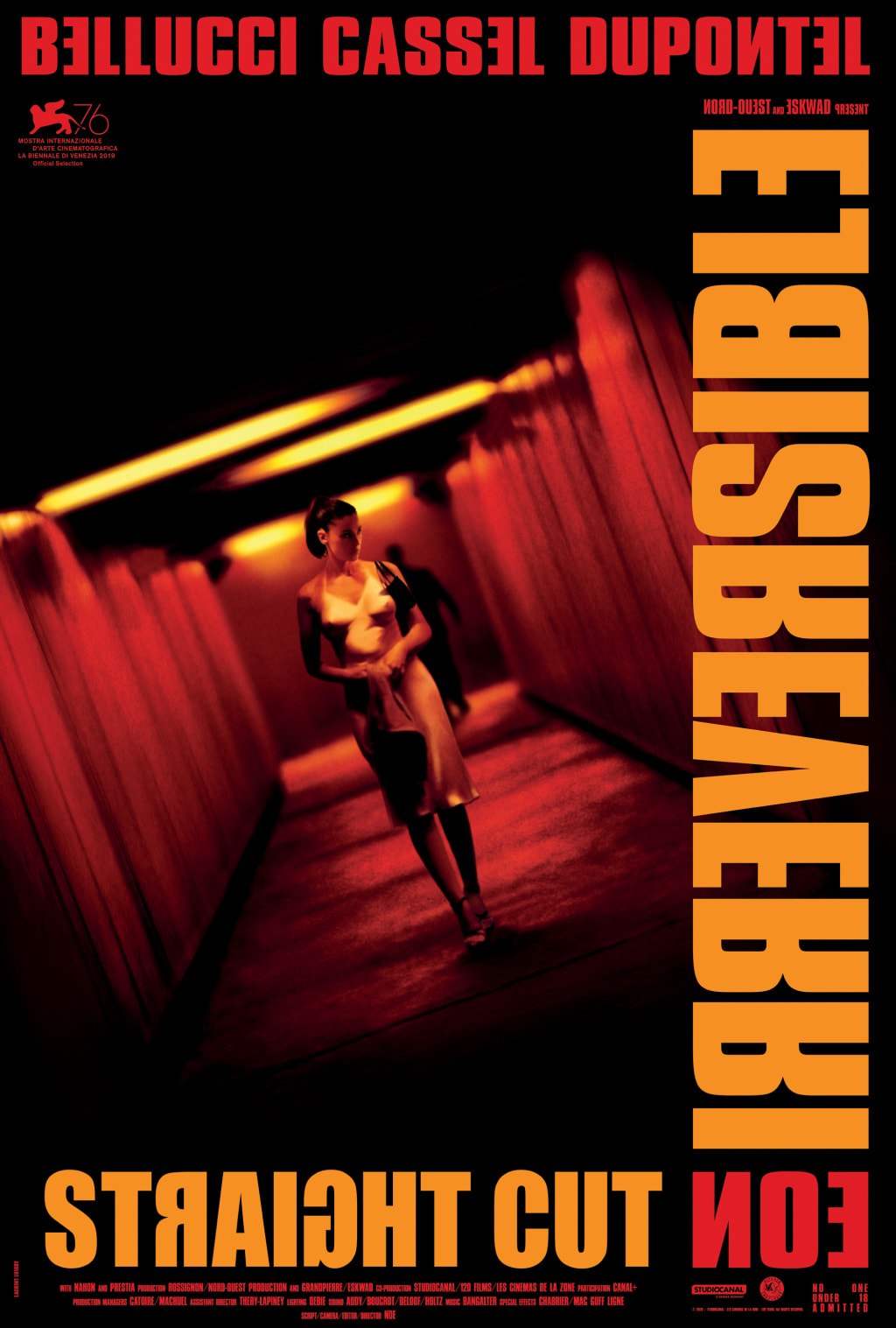
Irreversible (2002)
Directed Gaspar Noe
Written by Gaspar Noe
Starring Monica Bellucci, Vincent Cassell
Release Date May 22nd, 2002
Published February 8th, 2023.
Trigger Warning: This article directly confronts a scene of horrific sexual violence. I will be using the word Rape in this article for reasons I explain later. That said, if you are someone who does not feel comfortable with this topic or feels they may be subjected to trauma via this subject, I completely understand. I don't want you to read this and be taken by surprise. Reader discretion is advised.
Irreversible begins with the end credits moving backwards and immediately sets you into the disorientation you are going to experience as the story unfolds backwards. It's not just the credits moving backwards, or the words of the credits being inverted, it's Gaspar Noe's camera which moves not in the sense of being a fly on the wall but rather like a fly that never stops moving, looping, flying here and there up and down and upside down. It's legitimately headache inducing. It's intended to be.
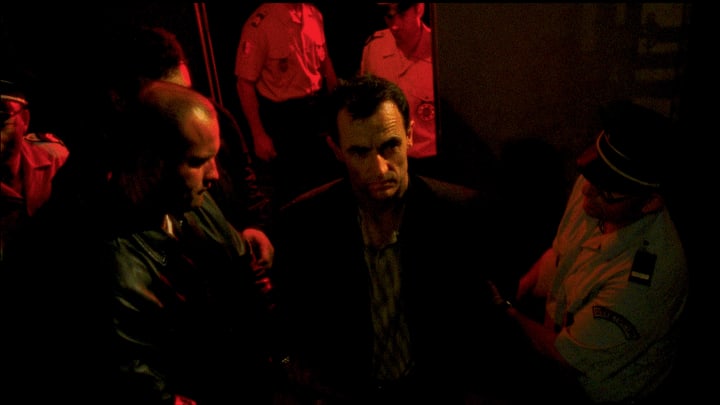
This camera/fly will lead us back in time, back inside a nightclub called Rectum where a murder has just occurred. We've just seen two men removed from the club to an ambulance and accompanied by Police. We are about to learn why they are surrounded by cops as the two of them have just brutally beaten a man to death so violently that his head is basically gone. It's not just the camera though that is leaving us achy and disjointed, the soundtrack is a swirling vortex of sound rising and falling, loud and then quiet. It's a disquieting, swirling and painful hum.
I will give the soundtrack credit, as hard as it is to listen to, it causes the kind of tense anxiety that our main character, Vincent Cassell's Marcus, is feeling as he shoves his way through this sex club searching for the man who sexually assaulted and nearly murdered Marcus' girlfriend, Alex (Monica Bellucci). Marcus is rage personified and the red lighting of the club seems to match the red-hot intensity of his burning, violent anger. Noe peppers the scene with scenes of hardcore gay sex that is nearly as disturbing as the violence that the scene is building to.
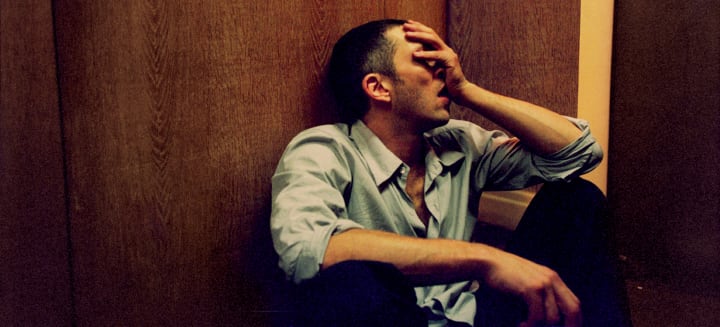
Sex and violence in the world of Gaspar Noe go hand in hand. A man who claims to know where Tenia, the man Marcus is looking for, can be found begs Marcus to Fist him in the ass, something that may in fact be pleasurable but carries with it a sense of something violent in the word fist, a part of the body far more often associated with punching, pounding or the breaking of facial bones. As the man points in the direction of someone who may be Tenia, more sexual violence is nearly enacted as Marcus finds himself in the position of being forcefully taken by this supposed Tenia.
That's when the murder occurs. Pierre (Albert Dupontel), Marcus's friend, and a man who also once loved Alex, steps in to rescue his friend. He does so by bashing the supposed Tenia with a fire extinguisher. Here, again, Noe's camera is as much an accomplice to the action as it is capturing the image. The movement of Noe's camera as Pierre proceeds to finish the job of bashing in this man's skull is stomach churning, nearly as much the sick, twisted, gross mess that is the man's face as Pierre's assault increases in violence.
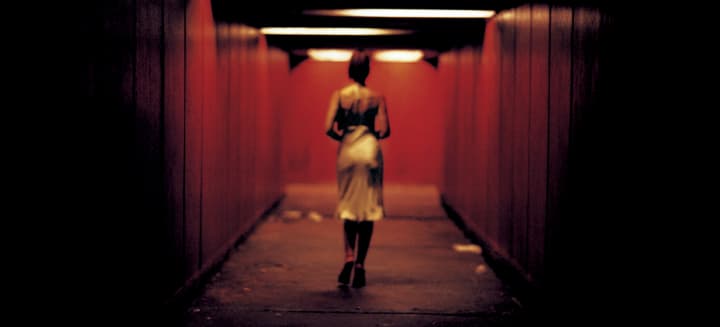
What has led to this violence we will soon find. Again, Irreversible unfolds from the end to the beginning. We follow Marcus and Pierre through Marcus' single minded pursuit of Tenia, his intent is revenge and when we see what he is intending to avenge, we come to understand his feelings. Marcus' beloved, Alex is in a coma after having been sexually assaulted in a scene that has become infamous for its dedication to the true horror of rape. The murder is also thrown into another ghastly bit of ugliness as we find out that the man who was killed was not the rapist. rather the rapist watched with excitement as the murder occurred, adding another twisted layer to the tragedy.
I am going to use the word rape because that visceral description is more truthful. Calling this sexual assault is far too sanitary for what happens to Alex. Alex is raped. This man, Tenia, who we find is not the man that we've just seen Marcus and Pierre beat to death, is a vile, rotten, bit of scum. We see him first assaulting another woman in this underground tunnel. When Alex objects, Tenia turns to her and enacts a scene of gut wrenching, horrific, sexual violence.
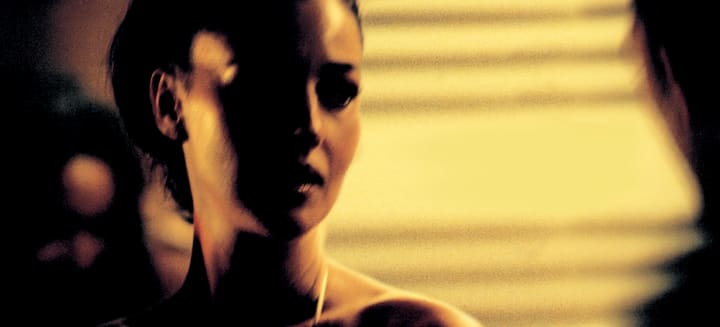
Whether you find this depiction of rape offensive or exploitative is purely subjective. I am not here to argue with you about that. If you are offended by this scene or find it to be exploitative of the crime of rape, I understand and respect your feelings. I can also identify with you in that, when I saw Irreversible following its controversial debut at the 2002 Cannes Film Festival, which made headlines for audiences walking out in droves during this scene, I also found the scene deeply offensive. I thought Gaspar Noe was a sick individual for committing such degradation to film.
20 plus years later, I've grown up a bit. I'm less of a hothead, less prone to a hot take. Watching Irreversible today, I found the scene horrifying but understandably so. Noe wants you, the audience, to confront fully what happened to Alex. The scene is unflinching and Noe's unmoving, unblinking camera, fully static for the first time in the film, on the ground at the same level as Bellucci's Alex, forces us to identify with Alex, to feel her horror.
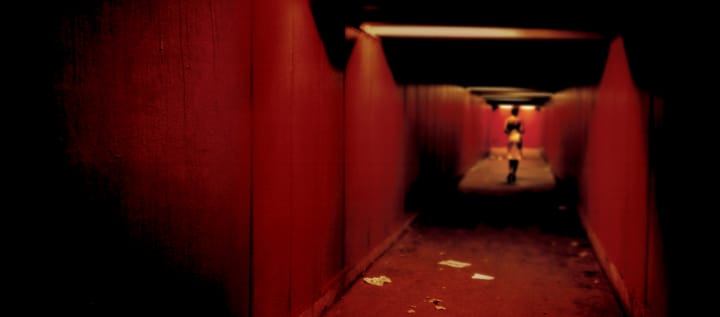
Noe has rightly pointed out that had the camera been moving in this scene, as it had been from the start, through the murder through the search for the murderer, it would place the audience not in Alex's position but rather in the position of the man assaulting her. It changes the dynamic of the scene, it becomes more artificial and exploitative, as if the camera were searching for bits to show you that you could only see if you were there looking around at what was happening. Holding the camera at floor level, keeping us fully in Alex's space, puts us fully at the mercy of the situation.
This static camera also reflects a philosophy that lies at the heart of Irreversible. As the rest of the movie plays out the loving, playful, intimate and troubled relationship between Alex and Marcus, we learn that Alex has been reading a book that posits the future is unchangeable, that human beings are at the mercy of a fate that is already decided for them. This is reflected by the unmoving camera which seems to remove any hope that this situation will change, that Alex might be saved from this fate. A moving camera would have us searching corners for a hero to emerge. That's unlikely when the camera is rooted to the ground, unable to foreshadow any arrival.
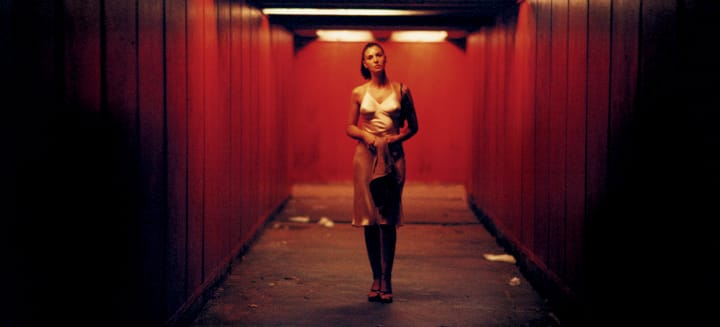
In fact, the unmoving camera captures even more how trapped in time this moment is. Deep in the background, we see a man enter the tunnel as the assault is occurring. The man stops, stares for a moment, out of focus, and leaves without having made any effort to stop what is happening. It underscores how nothing could change this moment, it's locked in time, it's a horrific and unchanging fate. It's a fate that grows more queasy when a later scene has Alex talking about a dream she had where she's walking in a broken red hallway.
Before we leave this scene and continue on the trail toward watching the Straight Cut of Irreversible, the version that turns the narrative around and shows these scenes chronologically rather than in reverse, I want to make another point about how incredibly bold, shocking, and how critical this scene is of other movies that are truly exploitation films. Before we see the assault that leads to the revenge that we've already seen occur, against the wrong man, Pierre attempts to reason with the out of control, rage choked, Marcus by pointing out how meaningless his quest for revenge is.
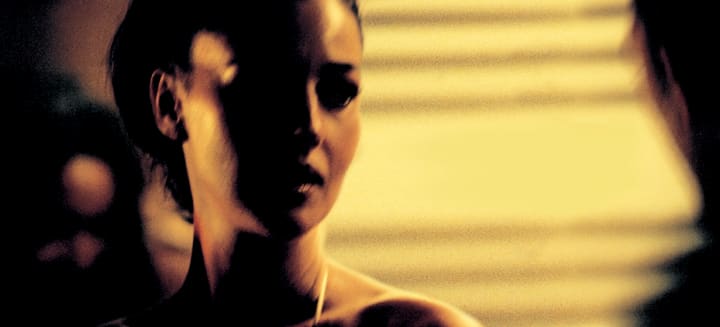
"This is f***ing B-Movie Revenge Crap" says Pierre. That line lays bare the emptiness of Hollywood rape revenge fantasies. Where those films marry sex and violence with entertainment and titillation, Noe aims to call out the audience that rages for bloody vengeance in the form of entertainment. Strangely, by showing the horror and degradation that Alex undergoes, Noe reflects back at us exactly the kind of thing Hollywood treats as a plot point, a way to set a protagonist on the road to blood soaked thrill ride. Noe is wagging a righteously accusatory finger at us by forcing us to remember that Alex is a human being, not a plot point.
There is a subtle underlining of this point later in the film. When Marcus and Alex are sharing an intimate moment and talking about going out with Pierre that night, Marcus reveals that he 'stole her away from him,' referring to Pierre. Alex scoffs and states plainly that she is not a thing to be stolen away, her decisions are her own, she is her own person. The point here is not that she will have her own decisions taken from her by her rapist. Rather, it's meant to underscore her basic humanity. She is not a toy for one man to take from another, she's a human being.
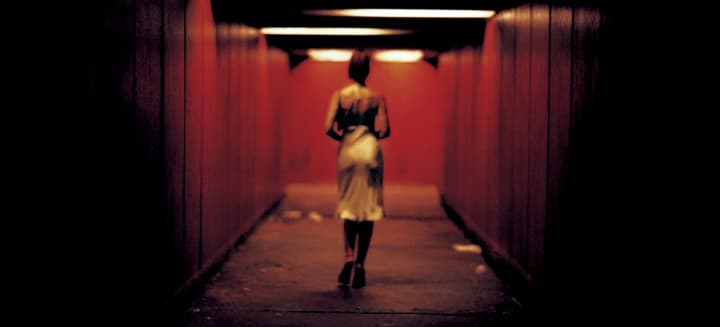
I didn't understand this point when I saw Irreversible 20 years ago. It struck me when I watched it today, for this article in 2023. It occurred to me, not for the first time, that what has so long been passed off as fodder for action movies is often dehumanizing. Hollywood dehumanizes victims, rendering them as mere signposts for one character to follow along the beats of an action plot, a revenge fantasy that loses track of what that vengeance is for. Noe intends to drag us back to remembering the basic humanity of his characters and that makes his movie far more impacting and real than any rape revenge movie Hollywood has ever made.
Irreversible is a gut-wrenching tragedy. After we've seen Alex raped and beaten into a coma, we travel back to see her in her full flower. In her relationship to Pierre and Marcus she has two highly dysfunctional men who care about her but often don't see her beyond her function in their life. Both accidentally or incidentally dehumanize this woman that they love, not out of malicious intent but rather as a failing of their character. They reflect our relationship to so many female characters in movies and how we view them as functions of our titillation, our entertainment, and how their fate might motivate us. It's all very self focused and Noe disabuses us of this perspective in the most violent and visceral fashion.
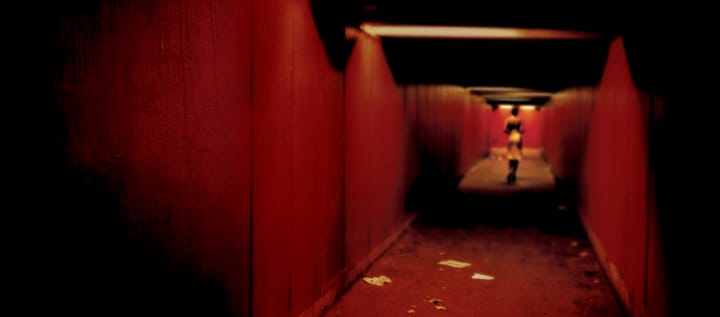
Things about Alex's life are revealed and the movie tracks back to a lovely and elegant grace note as Alex lays comfortably in the grass, in the park, reading a book. The camera spins and pans, showing children laughing and playing. We've just learned that Alex is pregnant herself and thus the impact of this ending is a gut punch, it takes the air out of your lungs. Now, flip the script. The Straight Cut of Irreversible shows the inexorable march from beauty to tragedy, from joy to pain, and from love to an all consuming rage and violent hate.
The Straight Cut of Irreversible is just as visceral, just as powerful as the original and its backwards flowing narrative. The Straight Cut slightly more convention for simply being chronological, but it still feels as if each of these characters' fates are sealed and time is taking us to the exact same place as before. Where the original feels like a trip through time, the Straight Cut feels more like a traditionally unfolding tragedy. The rape scene still arrives at the midpoint of the movie, it's still an axis point, a flashpoint between each side of the movie.
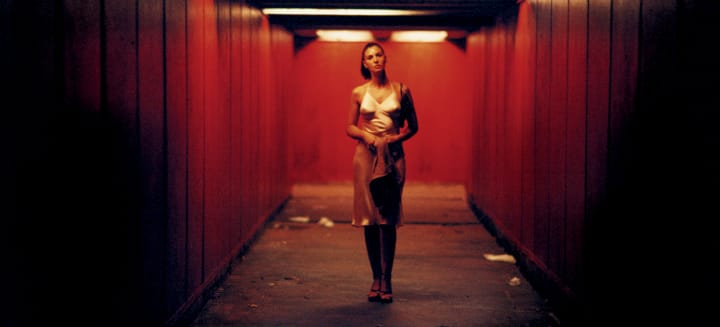
The filmmaking technique and the philosophical and moral points that Noe is making remain as potent and valuable as they are in the original version. The original feels more effective as the style acts on you more in the original right from the first moment. The Straight Cut is more conventional, beginning at a point of peace, proceeding through intimate moments between two ungodly beautiful people, and proceeding to build angst and tension via the introduction of Pierre who comes in like a lightning bolt with his focus on Marcus and Alex's sex life and the sexual shortcomings that he is convinced led him to lose Alex, again underlining the point of how both of these men casually dehumanize her, remove her agency, and subject her to their narrative.
In the Straight Cut of Irreversible, the ending violence becomes like an out of control train, raging off the track, destined to fly off the rails in horrific fashion. In the original, the ending is the beginning, we've had no time to get our bearings, we're thrust into this violent, alien world of sleazy sex and ungodly violence that doesn't let up until we reach fully back in time, only with the constant reminder of the inexorable future which underlines and laser focuses the film on its most tragic element. Bottom line, both versions of Irreversible are remarkable acts of cinema, a film that acts upon, changes you, forcing you to confront things about yourself and the way you see the world.
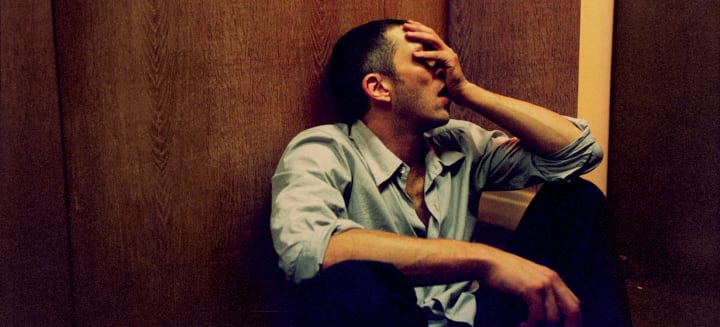
For all of the hand wringing I did over the portrayal of rape when I reviewed Irreversible in 2002, I am fully won over to the film 20 years later. Noe's work in Irreversible is far more humane, honest, and necessary than the tepid, sanitized and exploited versions of these themes that Hollywood has shoved down our throats for decades. In Irreversible, the victim is inescapably human, undeniable in her vulnerability and terror. Noe says 'Look Dammit!' This is not a plot point, it's a person.' Rape is a crime of unforgivable horror and needs to be taken seriously if it is to be portrayed on film.
Rape in movies feels exploitative when the crime is not treated with the life changing gravity it deserves. A filmmaker is making a very specific choice when they choose to engage with a character being sexually assaulted either as part of their backstory or by showing the act itself. We're invited to forget, while watching a movie, that a director could simply choose not to portray rape on screen. In life, the only choice involved is the one made by the rapist.
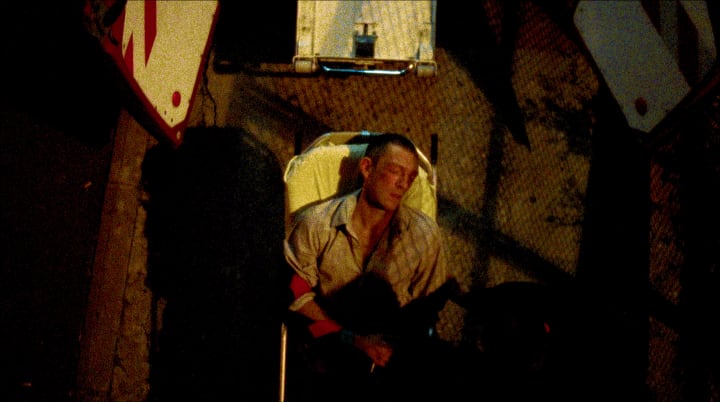
If this is not treated with seriousness, if Rape is simply used to provide motivation for some fantasy of vengeance, the gratuitous nature of the act is exposed. Irreversible is a thumb in the eye to those filmmakers unable to treat this with seriousness. Gaspar Noe's bold, terrifying and gut-wrenching film is a bold allegation against those who would try to use sexual violence as a plot point or a motivation, or a note for an actor play.
Irreversible is returning to theaters on February 10th in the Los Angeles area and other parts of the country in the weeks following. The Straight Cut is being featured alongside the original. I highly recommend the movie, it's an incredible work of polemical cinema from a masterful director. Though the film will always been known for that brutal rape scene, it's a far more skillful, thoughtful, human and honest work than it is credited as. Irreversible is hard to watch because it demands you see human beings enduring these trials not merely characters in a movie.
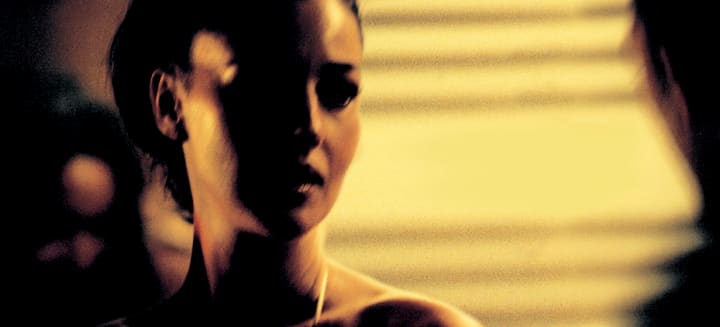
Theatrical Opening Dates:
2/10 - 2/16 - IFC Center (New York, NY)***
2/10 - 2/16 - Landmark's Nuart Theatre (Los Angeles, CA)
2/14 - PhilaMOCA (Philadelphia, PA)
2/14 - Popcorn Frights (Fort Lauderdale, FL)
2/17 - 2/23 Sie Film Center (Denver, CO)***
2/24 - 3/2 Alamo Drafthouse Mission (San Francisco, CA)***
2/24 - 3/2 Alamo Drafthouse South Lamar (Austin, TX)
2/24 - 3/2 Alamo Drafthouse Wrigleyville (Chicago, IL)
2/24 - 3/2 Alamo Drafthouse DTLA (Los Angeles, CA)
2/24 - 3/2 Alamo Drafthouse Manhattan (New York, NY)
2/24 - Alamo Drafthouse (Raleigh, NC)
2/24 - 2/28 - The Frida Cinema (Santa Ana, CA)
2/24 - 3/2 Central Cinema (Knoxville, TN)
3/10 - Cleveland Cinematheque (Cleveland, OH)
***35mm Print of the Original Cut on Select Dates
More Cities To Be Announced Soon. Find more ways to see the movie at https://www.alteredinnocence.net/irreversible.
Godard said "The way to criticize a movie is to make another movie." That's a good axiom to describe Irreversible. Noe has seen Hollywood portray rape and revenge on screen in inhumane fashion and for the sake of popcorn thrills. To criticize that approach, Noe made a movie that humanizes rape-revenge, brings it back to a place of human tragedy and out of the realm of entertainment. It's impossible to view rape-revenge as a subgenre after seeing Irreversible. It's also transformative in how we view female characters in movies and shines a harsh light on the small ways we dehumanize romantic partners, specifically but not solely, women, without even realizing we're doing it.

Find my archive of more than 20 years and nearly 2000 movie reviews at SeanattheMovies.blogspot.com. Find my modern review archive on my Vocal Profile, linked here. Follow me on Twitter at PodcastSean. Follow the archive blog on Twitter at SeanattheMovies. Listen to me talk about movies on the Everyone's a Critic Movie Review Podcast. If you've appreciated what you have read, consider subscribing to my writing here on Vocal. If you'd like to support my writing, you can do so by making a monthly pledge, or by leaving a one-time tip. Thanks!
About the Creator
Sean Patrick
Hello, my name is Sean Patrick He/Him, and I am a film critic and podcast host for the I Hate Critics Movie Review Podcast I am a voting member of the Critics Choice Association, the group behind the annual Critics Choice Awards.


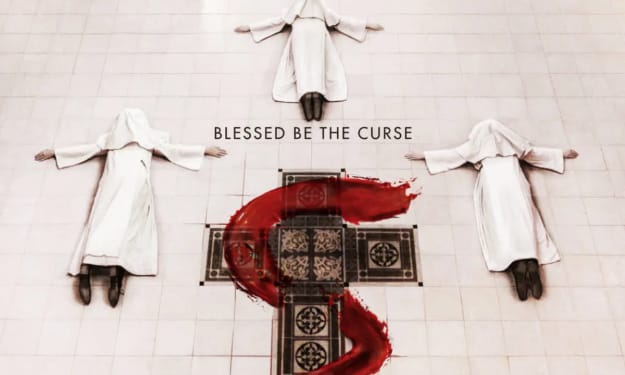

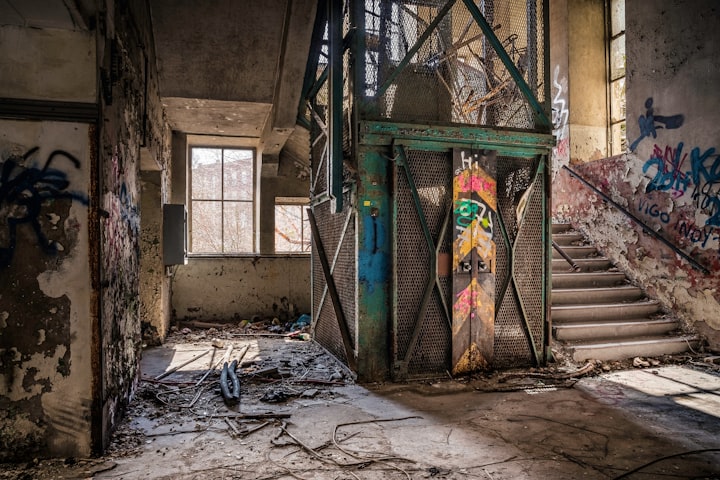

Comments
There are no comments for this story
Be the first to respond and start the conversation.